外研版七年级英语上册全部知识点89036
- 格式:doc
- 大小:47.00 KB
- 文档页数:5

MODULE 1一、同义句1.My name's Daming. = I'm Daming.2.I'mfrom England. = I come from England.3.Are you a new student. ≈ Are you new?4.Nice to meet you. = Nice to see you. =Glade to meet you. = Glade to see you.5.What's your name. = May I have your name.二、特殊疑问句—What's your name. —How old are you? = Can you tell me your age?—My name is .... = What's your age?—I'm twelve years old.—Where are you from? —What class are you in?—I'm from... —I'm in Class One, Grade One.三、单词短语1.practise + ding sth.2.with&and A and B go to the bank.A withB goes to the bank.四、形容性物主代词I--my you--your he--his she--her it--itswe--our you--your they--themMODULE 2一、单词职业:doctor manager secretary worker teacher工作地点:factory hospital hotel office school university二、短语a photo\picture of my family三、语法(can)Can do sth.I can\can't ride a bike.Can you ride a bike?Yes, I can.\No, I can't.四、句子What does your ... do?=What is\are you ...'s job?=What is your ...?He\She is a ... They're ...MODULE 3一、单词1.building in school: classroom dining hall gym library office science lab2.something: blackboard book classroom computer desk dictionary footballlibrary picture television3.numbers: thirteen fourteen fifteen sixteen seventeen eighteen nineteenthirty forty fifty sixty seventy eighty ninety4.介词:next to ≈ near behind ≠ in front of in on under5.in front of:在......前面in the front of:在......里面的前面 6.right 正确的≠wrong右边的≠left二、语音 er 、or 、ur 发/ə/ 三、语法(There be)----Are there any school offices?----Is there a computer on Miss Li's desk? ----No, there isn't. 注意:1.就近原则:There is some meat and two apple on the desk. 2.名词所有格: Miss Li's herLily and Lucy's 两人共有的 eg: Lily and Lucy's father. Lily's and Lucy's 两人各有的 Lily's and Lucy's fathers.MODULE 4一、family members:aunt uncle grandma grandmother grandpa grandfather mother father mum dad sister brother二、短语句型Thank you forhelping me.asking me.inviting me. Make a family tree for your family.----How many people are there in your family?----There are four. There are my mum and dad, my sister and me.----Have you got an aunt?/any .....?----Yes,I have./No,I haven't.----Have you got a small family or a big family?----I've got a big family.(选择疑问句)or的用法:① 或;② 并列否定:I don't like swimming or dancing.MODULE 5-6一、单词1. orange 橙汁have some orange[U]橙色the oranges are orange[C]橙子This is an orange[C]2.Kind 善良He is very kind.种类=tyre a kind / type of fruit two kinds /types of fruits 3.gym: 不受天气影响的室内体育馆、健身房或运动馆stadium: 周围有看台的露天大型运动场4.healthy ≠ unhealthy keep/stay healthyin good health ≠ in poor/bad healthbe healthy = be in health5.good for one health ≠ bad for one health二、短语see a film / see films = go to the cinemaMODULE 7一、短语about sth.谈论某事talk to sb.get up≠go to bedgo home≠leave home(for)study science/history/chemistry/maths/...二、语法①时间表达法:____ What's the time? What time it is?直 读 法 : It's two ten. (2:10)a cup of tea a glass of water a can of coke a bottle of juice a bowl of rice a piece of meat(当物为代词时,只能 用to 或for 的句型)____ 逆 读 法 : ①It's ten past two.(2:10) ≤30' ②It's ten to ten. (2:50) >30' 整点表达法:It's two o'clock. (2:00)(不用介词)【No. 1】一般现在时的功能1.表示事物或人物的特征、状态。
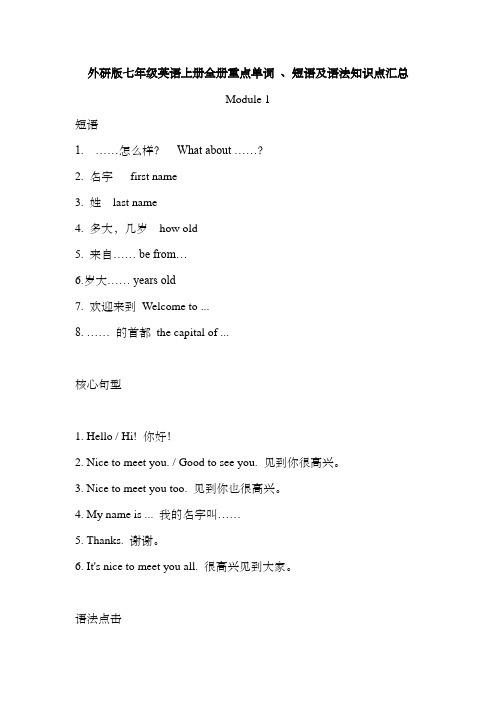
外研版七年级英语上册全册重点单词、短语及语法知识点汇总Module 1短语1. ……怎么样?What about ……?2. 名字first name3. 姓last name4. 多大,几岁how old5. 来自…… be from…6.岁大…… years old7. 欢迎来到Welcome to ...8. …… 的首都the capital of ...核心句型1. Hello / Hi! 你好!2. Nice to meet you. / Good to see you. 见到你很高兴。
3. Nice to meet you too. 见到你也很高兴。
4. My name is ... 我的名字叫……5. Thanks. 谢谢。
6. It's nice to meet you all. 很高兴见到大家。
语法点击有些同学一提到人称代词主格与形容词性物主代词就感到特别困惑。
下面就让我们看一下人称代词主格与形容词性物主代词的区别吧。
【例句】1. Daming and I are in Class Two. We are good friends. 大明和我在二班。
我们是好朋友。
2. He's from Africa. 他来自非洲。
3. His name is David. 他的名字是戴维。
4. Her father is 37 years old. 她的爸爸37 岁。
5. Their parents are from America. 他们的父母来自美国。
【总结】在英语中,I, you, he, she, it, we 和they 被称为人称代词主格,在句中作主语。
如例句1、2。
My, your, his, her, its, our 和their 是形容词性物主代词,后接名词。
如例句3、4、5。
Module 2短语1. 在左边,在左侧on the left2. 在右边,在右侧on the right3. 在……旁边,紧挨next to4. 在……前面in front of5. ……的经理the manager of ...6. 警察局police station7. 同样的…… the same ...8. 公交司机bus driver9. 农场工人farm worker核心句型1. What a big family! 真是一个大家庭啊!2. I see. 我明白了。
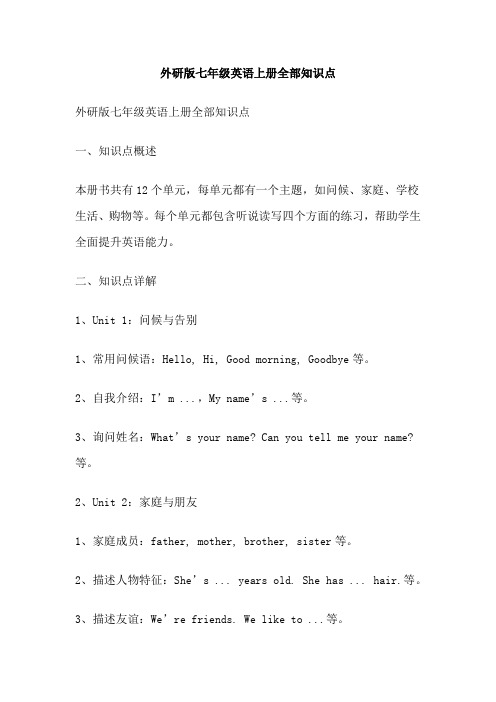
外研版七年级英语上册全部知识点外研版七年级英语上册全部知识点一、知识点概述本册书共有12个单元,每单元都有一个主题,如问候、家庭、学校生活、购物等。
每个单元都包含听说读写四个方面的练习,帮助学生全面提升英语能力。
二、知识点详解1、Unit 1:问候与告别1、常用问候语:Hello, Hi, Good morning, Goodbye等。
2、自我介绍:I’m ...,My name’s ...等。
3、询问姓名:What’s your name? Can you tell me your name?等。
2、Unit 2:家庭与朋友1、家庭成员:father, mother, brother, sister等。
2、描述人物特征:She’s ... years old. She has ... hair.等。
3、描述友谊:We’re friends. We like to ...等。
3、Unit 3:学校与课程1、校园设施:library, playground, classroom等。
2、课程名称:English, Maths, Science等。
3、时间表述:It’s ... o’clock. We have ... at ... o’clock.等。
4、Unit 4:食物与饮食1、食物分类:fruit, vegetables, meat, dairy等。
2、饮食习惯:I like to eat ... I don’t like ...等。
3、餐厅用语:Can I have ...? What would you like to eat/drink?等。
5、Unit 5:购物与交易1、商品价格:It costs ...,They sell ... for ...等。
2、购物用语:Can I help you? I want to buy ...等。
3、交易过程:Here’s the change. Thank you.等。

外研版七年级上册知识点整理Module 1重点短语1.be from... =come from...来自......2....years old......岁3.what about... =how about.........怎么样?4.in Class Ten, Grade Seven在七年级十班5.the capital of......... 的国都 /省会6.first name =given name名st name=family name姓8.English name英文名字9.Chinese name中文名字重点句子1.I ’ m Chinese ,and I’ m from China我.是中国人,我来自中国(I ’ m Chinese, and I comeomfr China.)2. Where are they from?他们来自什么哪里?(=Where do they come from?)They are from America.他们来自美国.(=They come from America.)3.How old is that man?那位男子多少岁了?He is forty-four.他44岁4.The students are in Class Five, Grade Seven.这些学生在七年级五班5. Tom is in Class One with Lingling.汤姆和玲玲在一班。
=Tom with Lingling is in Class One.=Tom and Lingling are in Class One.6.What about you?=How about you?=And you? 你呢? /你怎么样?7.Welcome to Class 6 Grade 7 !欢送到七年级六班。
8. Beijing is the capital of China.北京是中国的国都。

七年级上册英语外研版知识点整理如下:一、词汇短语1.hello/hi:你好。
2.goodbye/bye-bye/bye:再见。
3.please:请。
4.thank you:谢谢。
5.sorry:对不起,抱歉。
6.fine:好的。
7.how are you?:你好吗?8.what’s your name?:你叫什么名字?9.my name is…/I’m…:我的名字是……。
10.nice to meet you:很高兴见到你。
二、重点句型—What’s your name? 你叫什么名字?—My name is …/ I’m …. 我的名字是……。
—What’s his/her name? 他/她叫什么名字?—His/Her name is …. 他/她的名字是……。
—Nice to meet you! 见到你很高兴!—Nice to meet you, too! 见到你我也很高兴!—How are you? 你好吗?—Fine, thanks. 很好,谢谢。
—This is Mr/Ms/Miss …. 这是……先生/女士/小姐。
—This is my friend, …. 这是我的朋友……。
—Where are you from? 你来自哪里?—I’m from …. 我来自……。
—How old are you? 你多大了?—I’m …. 我……。
—What class are you in? 你在哪个班级?—I’m in Class …. 我在……班级。
—What’s your telephone number? 你的电话号码是多少?—It’s …. 它是……。
三、语法知识点名词复数形式的变化规则:一般情况下,直接在名词后加s;以s,x,sh,ch结尾的名词,在词尾加es;以辅音字母+y结尾的名词,变y为i再加es;以f或fe结尾的名词,把f或fe改为v再加es;不规则变化,需要单独记忆。
人称代词和物主代词的区别和用法:人称代词用来代替人或事物的名称,分为主格和宾格两种形式;物主代词用来表示某人或某事物所属,分为形容词性物主代词和名词性物主代词两种形式。

外研版七年级上册英语全册知识点归纳MODULE 1一、同义句1.My name's Daming. = I'm Daming.2.I'm from England. = I come from England.3.Are you a new student? ≈ Are you new?4.Nice to meet you. = Nice to see you. =Glade to meet you. = Glade to see you.5.What's your name ? = May I have your name?二、特殊疑问句1. 询问姓名:—What's your name? —My name is .... = I’m…—What's his/her name? —His/her name is .... = He/She is…2.询问年龄:—How old are you? = Can you tell me your age?= What's your age?—I'm twelve years old.3.询问来自哪里:—Where are you from? —I'm from...—Where is he/she from? —He’s/She’s from...—Are you from China ? —Yes, I am/ we are. No, I’m not/ we aren’t.4.询问在哪个班:—What class are you in? —I'm in Class One, Grade Seven.三、单词1.China —Chinese America —American England —Englishcapital city2.small — big first— last everyone all四、语法1.代词人称代词主格 I you he she it we you they形容词性物主代词(…的) my your his her its our your their2.be动词:am I am= I’m I am not= I’m notis He /She is = He’s /She’s is not = isn’tare We /You /They are = We’re / You’re /They’re are not= aren’tMODULE 2一、单词grandparents grandfather—grandmother parents father—mother mum---dad daughter—son sister—brother aunt—uncle cousin husband---wife family woman---man women---men职业:job actor driver doctor manager nurse worker teacher policeman工作地点:factory hospital hotel office school theatre bus station shop二、短语a photo/picture of my family in front of in/at the frontof next toon the right --- on the left三、语法1.this---that these---those I---we he/she/it---they2.名词所有格:Miss Li's =her Tom’s = hisLily and Lucy's 两人共有的 eg: Lily and Lucy's desk is big Lily's and Lucy's 两人各有的Lily's and Lucy's desks are small.My parents’ room is very clean.四、句子1.---Is this your sister? --- Yes, it is. No, it isn’t---Are these her books? ---Yes, they are. No, they aren’t.2.---Who is this? --- This is my brother.--- Who are they/these? --- They are my cousins3. ---What’s your sister’s name?---My sister’s name is…/Her name is…4.---What does your father do?=What is your father's job?=What is your father?---He is a ...MODULE 3一、单词1.buildings: classroom, dining/sports hall, library, office, science lab, playground2.something: blackboard, book , room, computer, desk, furniture, map,wall,picture, television3.numbers: thirteen fourteen fifteen sixteen seventeen eighteen nineteenthirty forty fifty sixty seventy eighty ninety4.介词:next to ≈ near behind ≠ in front of in/at the front of:在......里面的前面in on under5. in the middle of on the left of--- on the right ofbetween …and… a map of our school6.right 正确的≠wrong右边的≠left二、句子1. Where is the office building ? It is between the dining hall and the library.2. How many students are there in your class? There are 38 students in my class.三、语法(There be)----Are there any school offices?----Yes, there are. There are some offices.----Is there a computer on Miss Li's desk?----No, there isn't.注意:1.就近原则:1). There is an orange and two apples on the desk.There are two apples and an orange on the desk.2). There are some students in the classroom.Are there any students in the classroom? Yes, there are. No, therearen’t3)There aren’t any students in the classroom.There isn’t an orange on the desk.MODULE 4一、family members:aunt uncle grandma grandmother grandpa grandfather mother father mum dad sister brother二、短语句型Thank you for your email.your help.helping me.asking me.inviting me.Make a family tree for your family.----How many people are there in your family?----There are four. There are my mum and dad, my sister and me.----Have you got an aunt?/any .....?----Yes,I have./No,I haven't.----Have you got a small family or a big family?----I've got a big family.or的用法:①或; (选择疑问句)②并列否定:I don't like swimming or dancing.MODULE 5-6一、单词1. orange 橙汁 have some orange [U]橙色 the oranges are orange [C]橙子 This is an orange [C]2.kind 善良 He is very kind.种类=tyre a kind / type of fruit two kinds /types of fruits3. gym: 不受天气影响的室内体育馆、健身房或运动馆stadium: 周围有看台的露天大型运动场4.healthy ≠ unhealthy keep/stay healthy保持健康in good health ≠ in poor/bad healthbe healthy = be in healthbe good for one’s health ≠be bad for one’s health名词变复数条件变化形式例词一般情况 + - s shops单词以s、x、ch、sh结尾 + - es buses以辅音字母+y结尾去y为i + -es city-cities单词以“o”结尾有生命+ - es tomatoes无生命 + - s zoos 一些以‘f’或‘fe’结尾的单词把’f‘或’fe‘变成’ves' knife-knives二、短语三、句型四、区别MODULE 7一、短语talk about sth.谈论某事talk to sb. 跟某人谈话(一方讲一方听)talk with sb. 跟某人谈话(双方都讲)get up≠go to bedgo home≠leave home(for)study science/history/chemistry/maths/...二、语法①时间表达法:What's the time? =What time it is?顺读法: It's two ten. 2:10 (直接读出数字)逆读法:①It's ten past two.(2:10) ≤30'②It's ten to ten. (2:50) >30'整点表达法:It's two o'clock. (2:00) 注意: (不用介词)②一般现在时(1)【No. 1】一般现在时的功能1.表示事物或人物的特征、状态。
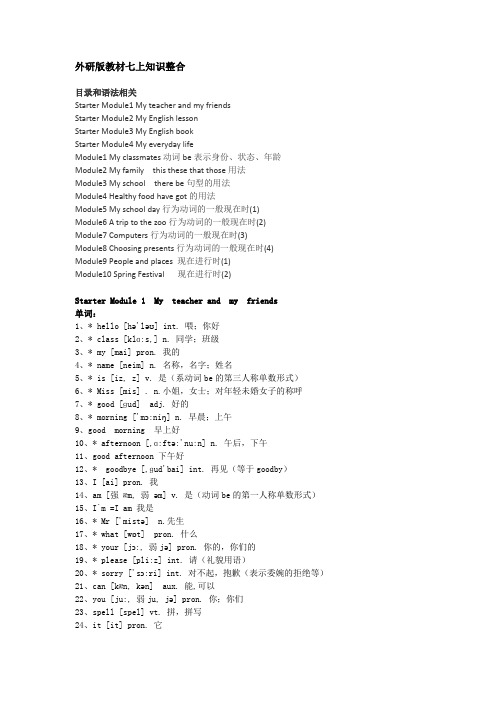
外研版教材七上知识整合目录和语法相关Starter Module1 My teacher and my friendsStarter Module2 My English lessonStarter Module3 My English bookStarter Module4 My everyday lifeModule1 My classmates 动词be表示身份、状态、年龄Module2 My family this these that those用法Module3 My school there be句型的用法Module4 Healthy food have got的用法Module5 My school day行为动词的一般现在时(1)Module6 A trip to the zoo行为动词的一般现在时(2)Module7 Computers行为动词的一般现在时(3)Module8 Choosing presents行为动词的一般现在时(4)Module9 People and places 现在进行时(1)Module10 Spring Festival 现在进行时(2)Starter Module 1 My teacher and my friends单词:1、* hello [hə'ləʊ] int. 喂;你好2、* class [klɑ:s,] n. 同学;班级3、* my [mai] pron. 我的4、* name [neim] n. 名称,名字;姓名5、* is [iz, z] v. 是(系动词be的第三人称单数形式)6、* Miss [mis] . n.小姐,女士;对年轻未婚女子的称呼7、* good [ɡud] adj. 好的8、* morning ['mɔ:niŋ] n. 早晨;上午9、good morning 早上好10、* afternoon [,ɑ:ftə:'nu:n] n. 午后,下午11、good afternoon 下午好12、* goodbye [,ɡud'bai] int. 再见(等于goodby)13、I [ai] pron. 我14、am [强æm, 弱əm] v. 是(动词be的第一人称单数形式)15、I`m =I am 我是16、* Mr ['mistə] n.先生17、* what [wɒt] pron. 什么18、* your [jɔ:, 弱jə] pron. 你的,你们的19、* please [pli:z] int. 请(礼貌用语)20、* sorry ['sɔ:ri] int. 对不起,抱歉(表示委婉的拒绝等)21、can [kæn, kən] aux. 能,可以22、you [ju:, 弱ju, jə] pron. 你;你们23、spell [spel] vt. 拼,拼写24、it [it] pron. 它25、yes [jes] adv. 是, 是的26、thank [θæŋk] vt. 谢谢27、how [hau] adv. 如何怎样28、are [强ɑ:, 弱ə] v. 是(be的第二人称单复数现在式)29、* fine [fain] adj. 很好的;不错的30、* thanks [θæŋks] int. 谢谢31、Mrs ['misiz] n. 太太;夫人32、* too [tu:] adv. 也;还33、* this [ðis] pron. 这;这个(指较近的人或事物)34、* she [ʃi:] pron. 她(主格)35、* teacher ['ti:tʃə] n. 教师;导师36、* friend [frend] n. 朋友;助手37、* her [hз:,hə] pron. 她的38、* his [hiz, 弱iz] pron. 他的39、* nice [nais] adj. 令人愉快的;美好的40、* to [强 tu:, 弱 tu, 辅音前弱tə](与原形动词一起构成动词不定式)41、* meet [mi:t] vt. 结识;遇见42、* time [taim] n. 时间;时代;次数43、* go [ɡəu] vi. 走;去44、* now [nau] adv. 现在;目前45、* bye [bai] int. 再见46、* see [si:] vi. 看;看见47、* tomorrow [tə'mɔrəu] n. 明天;未来重点短语:1. good morning早上好2. good afternoon下午好3. thank you谢谢你4. my teacher我的老师5. my friend我的朋友6. Miss Zhou周老师7.It' s time to do sth.到做某事的时间了。
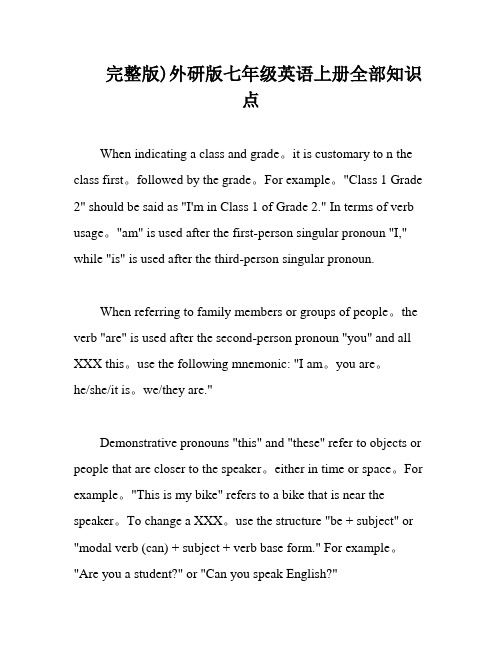
完整版)外研版七年级英语上册全部知识点When indicating a class and grade。
it is customary to n the class first。
followed by the grade。
For example。
"Class 1 Grade 2" should be said as "I'm in Class 1 of Grade 2." In terms of verb usage。
"am" is used after the first-person singular pronoun "I," while "is" is used after the third-person singular pronoun.When referring to family members or groups of people。
the verb "are" is used after the second-person pronoun "you" and all XXX this。
use the following mnemonic: "I am。
you are。
he/she/it is。
we/they are."Demonstrative pronouns "this" and "these" refer to objects or people that are closer to the speaker。
either in time or space。
For example。
"This is my bike" refers to a bike that is near the speaker。
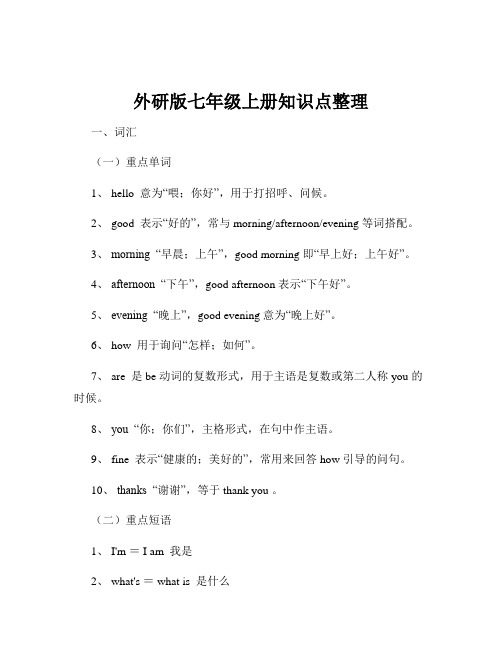
外研版七年级上册知识点整理一、词汇(一)重点单词1、 hello 意为“喂;你好”,用于打招呼、问候。
2、 good 表示“好的”,常与 morning/afternoon/evening 等词搭配。
3、morning “早晨;上午”,good morning 即“早上好;上午好”。
4、afternoon “下午”,good afternoon 表示“下午好”。
5、evening “晚上”,good evening 意为“晚上好”。
6、 how 用于询问“怎样;如何”。
7、 are 是 be 动词的复数形式,用于主语是复数或第二人称 you 的时候。
8、you “你;你们”,主格形式,在句中作主语。
9、 fine 表示“健康的;美好的”,常用来回答 how 引导的问句。
10、thanks “谢谢”,等于 thank you 。
(二)重点短语1、 I'm = I am 我是2、 what's = what is 是什么3、 in English 用英语二、语法(一)be 动词的用法1、 be 动词(am/is/are)的意思和用法很多,在一般现在时中,“am”用于第一人称单数 I 之后,“is”用于第三人称单数(he/she/it)之后,“are”用于第二人称(you)以及复数(we/they)之后。
例如:I am a student He is a teacher You are nice They are friends(二)人称代词1、人称代词分为主格和宾格。
主格在句子中作主语,宾格在句子中作宾语。
主格:I, you, he, she, it, we, they宾格:me, you, him, her, it, us, them(三)一般疑问句1、一般疑问句是以 be 动词、助动词或情态动词开头,用 yes 或 no 来回答的疑问句。
例如:Are you a student? Yes, I am / No, I'm not三、句型(一)问候语1、 Hello! / Hi! 你好!(用于朋友、熟人之间打招呼)2、 Good morning/afternoon/evening! 早上/下午/晚上好!(二)自我介绍1、 I'm 我是2、 My name is 我的名字是(三)询问对方身体状况1、 How are you? 你好吗?Fine, thank you 很好,谢谢。
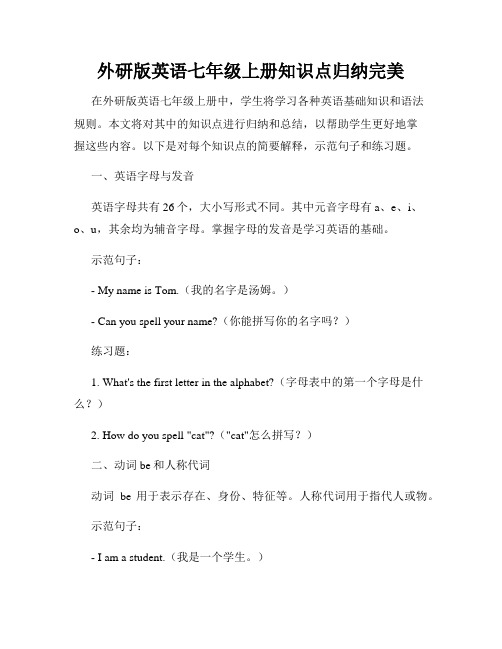
外研版英语七年级上册知识点归纳完美在外研版英语七年级上册中,学生将学习各种英语基础知识和语法规则。
本文将对其中的知识点进行归纳和总结,以帮助学生更好地掌握这些内容。
以下是对每个知识点的简要解释,示范句子和练习题。
一、英语字母与发音英语字母共有26个,大小写形式不同。
其中元音字母有a、e、i、o、u,其余均为辅音字母。
掌握字母的发音是学习英语的基础。
示范句子:- My name is Tom.(我的名字是汤姆。
)- Can you spell your name?(你能拼写你的名字吗?)练习题:1. What's the first letter in the alphabet?(字母表中的第一个字母是什么?)2. How do you spell "cat"?("cat"怎么拼写?)二、动词be和人称代词动词be用于表示存在、身份、特征等。
人称代词用于指代人或物。
示范句子:- I am a student.(我是一个学生。
)- She is my sister.(她是我的妹妹。
)练习题:1. ________ you a teacher?(你是一名老师吗?)2. ________ she your friend?(她是你的朋友吗?)三、名词的单复数形式名词的单数形式和复数形式有规律可循。
一般情况下,在名词的末尾加-s可以得到复数形式。
示范句子:- This is a book.(这是一本书。
)- These are pens.(这些是钢笔。
)练习题:1. This is a ________.(这是一个篮球。
)(单数形式)2. Those are ________.(那些是学生。
)(复数形式)四、冠词和不定代词冠词包括定冠词"the"和不定冠词"a/an",用于限定名词的范围。
不定代词用于泛指某人或某物。
示范句子:- I have a cat.(我有一只猫。

外研版七年级上册英语知识点归纳摘要:一、外研版七年级上册英语知识点归纳1.问候与告别2.介绍与问候3.欢迎与回应4.礼貌用语5.be 动词的用法6.人称及人称代词的不同形式7.同义句正文:一、外研版七年级上册英语知识点归纳在初中英语学习中,外研版七年级上册的知识点涵盖了日常生活、语言交流等方面的内容。
为了帮助大家更好地掌握这些知识点,本文将对其进行归纳整理。
1.问候与告别在英语中,问候与告别是非常基本的日常交流用语。
常见的问候用语有:good morning(早上好)、good afternoon(下午好)、good evening(晚上好),而告别用语则有:good night(晚安)。
2.介绍与问候在英语中,介绍自己或他人时,通常需要用到人称代词的主格和宾格形式。
例如,I(我)是主格,me(我)是宾格;you(你)是主格,your(你的)是宾格等。
在介绍他人时,我们通常使用“This is...”这个句型。
3.欢迎与回应当迎接他人时,我们通常会使用“Welcome to...”这个句型表示欢迎。
例如:Welcome to our school(欢迎来到我们学校)。
而他人表示感谢时,通常会回答“Thank you”或“Thanks”。
4.礼貌用语在英语中,礼貌用语是非常重要的。
常见的礼貌用语有:please(请)、thank you(谢谢)、you"re welcome(不客气)、excuse me(对不起)等。
5.be 动词的用法be 动词是英语中最基本的动词之一,它有三种变形:am、is、are。
记忆口诀为:“我”用am,“你”用are,is 用于“他、她、它”;单数全都用is,复数全部都用are。
6.人称及人称代词的不同形式人称代词有主格和宾格之分。
例如:I(我,主格)和me(我,宾格);you(你,主格)和your(你的,宾格)等。
在英语中,主格通常用于句子的主语位置,而宾格则用于动词和介词之后。

外研版英語七年級上冊知識點總結Module1 Classmates1. be from = come from 來自I am from China. = I come from China. 我來自中國。
Where are you from? = Where do you come from? 你來自哪兒?2. ---What’s your name? ---What’s his name? ---What’s her name? ---My n ame is Tom. / I’m Tom.---His name is Daming. ---Her name is Lingling.3. ---How old are you? ---How old is he / she? ---I’m 15 years old. ---He / she is 14 years old.4. ---What class are you in? ---What class is he in?---I am in Class 1, Grade 7. ---He is in Class 1, Grade 7.5. Good to see you. = Nice to see you. = Glad to see you. 見到你很高興。
6. What about …= How about … 怎麼樣(詢問)What / How about your school life?7. the capital of… …の首都Beijing is the capital of China.8. a very big city 一個非常大の城市Shanghai is a very big city.9. first name = given name 名字last name = family name 姓10. welcome to sp. 歡迎來到某地Welcome to China.11. I’m from China. I’m Chinese. I can speak Chinese. I’m from England. I’m English. I can speak English.12. I am from China, too. I can also speak English. I don’t like the book , either.13. Is everyone here today? 今天大家到齊了嗎?14. Chinese: 中國人,中國のI am Chinese. 中國人I am a Chinese girl. 中國のEnglish: 英國人,英國のI am English. 英國人I am an English girl. 英國の作文1 About myself.My name is Tom. / I’m Tom. I’m a student in No. 3 Middle School. I am 15 years old. I’m from China and I am Chinese. I can speak English , too. I am in Class 1, Grade 7. I like sports. / I like doing sports. My favourite sport is basketball. / Playing basketball is my favourite sport.範文2 My friendThis is my friend. His name is Tom. He is from America. Now he is in Beijing. He is 13 years old. He’s in No. 14 Middle School. He is in Class One, Grade One. We’re in the same class. His father is a teacher. He teaches English. His mother is a teacher , too. His parents are in the same school. But his parents aren’t in our school.Module2 My family Vocabulary:A family: father—mother dad (daddy)—mum ( mom) / mummy parent –parentsuncle —aunt brother—sister son—daughter husband—wife man -- womanboy —girl grandfather -–grandmother grandpa –- grandma grandparent –grandparents cousinB job: a driver, a farmer, a worker, a manager, a teacher, a student, a doctor, a nurse,a singer, a writer, an actor, an actress, a policeman, policewoman,C place: at a bus station, in a hospital, in a hotel, at a theatre, on a farm, at school, in the shop, in a factory1. I have an elder brother. 哥哥She has a younger / little sister. 妹妹2. This is a photo of my family. 一張我の全家福My family is a big one. 家庭This is Jim’s family tree. 家譜My family are watching TV now. 家人3. on the left 在左邊on the right 在右邊on the left / right of 在…の左邊/ 右邊4. next to 在…旁邊,緊挨著= beside = near5. in front of 在…前面(相對獨立)in the front of 在……前部(在…內部)There is a tree in front of the house.There is a blackboard in the front of the classroom.6. at the bus station 在公共汽車站at school 在學校at the same hospital 在同一所醫院at a police station 在警局7. (be) in hospital(生病)住院in the hospital 在醫院Tom is ill in hospital because he is ill. Tom’s father works in the hospital.8. in the photo 照片上There is a big house in the photo.9. a manager of a theater = a theater manager 一個劇院經理10. a manager of a hotel = a hotel manager 一個旅館經理11. a bus driver 一位公共汽車司機 a farm worker 一位農場工人a shop worker 一名店員an English teacher 一位英語老師12. man –woman (men –women) a woman doctor –women doctors 女醫生a man teacher – men teachers 男老師There are three men teachers in the office.13. Is this / that your family? → Yes, it is. / No, it isn’t.Are these / those your parents? → Yes, they are. / No, they aren’t.14. Who is this? Who is this boy?Who are the boy and the girl? They are my friends.15.問職業:What is your mother? = What does your mother do? = What is your mother’s job? What be + 名詞(主語)?What do / does + 主語+do? What be one’s job? 16. 介紹家庭常用の句型。
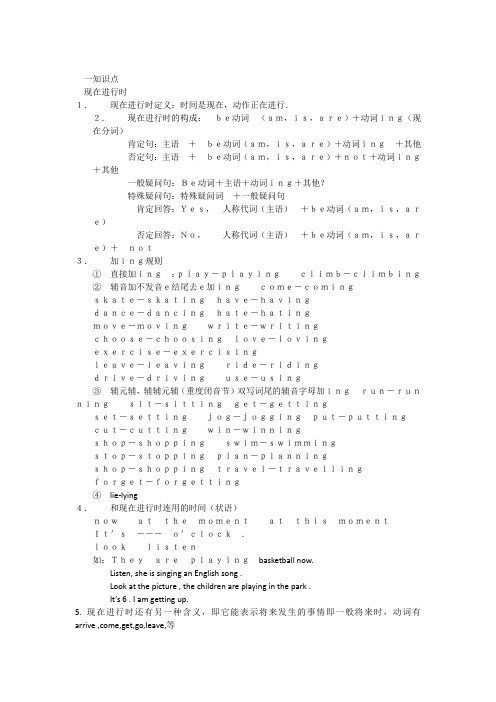
一知识点现在进行时1.现在进行时定义:时间是现在,动作正在进行.2.现在进行时的构成:be动词(am,is,are)+动词ing(现在分词)肯定句:主语+be动词(am,is,are)+动词ing+其他否定句:主语+be动词(am,is,are)+not+动词ing+其他一般疑问句:Be动词+主语+动词ing+其他?特殊疑问句:特殊疑问词+一般疑问句肯定回答:Yes,人称代词(主语)+be动词(am,is,are)否定回答:No,人称代词(主语)+be动词(am,is,are)+not3.加ing规则①直接加ing:play-playingclimb-climbing②辅音加不发音e结尾去e加ingcome-comingskate-skatinghave-havingdance-dancinghate-hatingmove-movingwrite-writingchoose-choosinglove-lovingexercise-exercisingleave-leavingride-ridingdrive-drivinguse-using③辅元辅,辅辅元辅(重度闭音节)双写词尾的辅音字母加ingrun-runningsit-sittingget-gettingset-settingjog-joggingput-puttingcut-cuttingwin-winningshop-shoppingswim-swimmingstop-stoppingplan-planningshop-shoppingtravel-travellingforget-forgetting④lie-lying4.和现在进行时连用的时间(状语)nowatthemomentatthismomentIt's―――o'clock.looklisten如:Theyareplayingbasketball now.Listen, she is singing an English song .Look at the picture , the children are playing in the park .It’s 6 . I am getting up.5. 现在进行时还有另一种含义,即它能表示将来发生的事情即一般将来时,动词有arrive ,come,get,go,leave,等如; We are leaving on Monday .Are you going anywhere tomorrow ?The bus is coming .典型题型Her parents give ____ a nice present When New Year is coming .A.SheB. she’sC. herD. hers解析:新年要到时她的父母给她一个漂亮的礼物,没的动词后做宾语用宾格。
七年级(上)Module1 My classmates1.系动词be的用法:am用于第一人称I后; is用于第三人称单数后;are用于第二人称you及各种人称复数后。
口诀:I是am you是are is 用于he, she, it,复数形式全用are 。
2. 陈述句变一般疑问句的句式:(1)be+主语+...... eg: Are you a student? (2)情态动词(can)+ 主语+ 动词原形+……eg: Can you speak English?(3)助动词(do, does, did)+ 主语+ 动词原形+......Eg: Do you like English?3. 代词(1)人称代词:主格:I we you you he she it they ( 做主语)宾格:me us you you him her it them ( 作宾语/表语)(2)物主代词:形容词性物主代词:my our your yourhis her its their (做定语)名词性物主代词:mine ours yours yourshis hers its theirs (作定语以外成分)名词性物主代词=形容词性物主代词+名词eg: mine = my book语言点解析1.Chinese n. 汉语;中国人adj. 中国的,中国人的(1)作“语文,汉语”讲时,为不可数名词。
作“中国人”讲时,为可数名词,单复数形式相同。
Eg: He can speak a little English.We are all Chinese. 我们都是中国人。
(2)作为“中国的,中国人的”讲时,为形容词。
I’m a Chinese student. 我是一名中国的学生。
2. What about/ How about…的用法(1)What about you = How about you 用来询问对方或第三者对前面所讨论话题的看法。
(2) What about = How about + n./pron./v-ing 表示“怎么样”用来提出建议或请求。
Eg: How about listening to some music? 听点音乐怎么样呢?How about some apples? 吃些苹果怎么样?3. Nice to meet you! = It’s nice to meet you!Glad to meet you! = I’m glad to meet you!4.welcome v. 欢迎Adj. 受欢迎的(1)“欢迎”welcome sb. to...“欢迎某人到......”eg. Welcome you to China. 欢迎你来到中国。
(2)用作答谢的客套话,表示“不客气”eg.—Thank you! 谢谢你!—You are welcome! 不客气!5.在英语中,英美名字在前,姓在后first name = give name 名字last name = family name 姓1.too adv. 也;太(1)表示“也”,常放在肯定句句尾,表示某情况也适合某人。
句尾常用逗号隔开。
(2)表示“太”,修饰形容词或副词的原级。
Eg: The room is too big. 这个房间太小了。
2.表示某年级班级时,先说班级再说年级,class和grade 首字母大写。
eg: I’m Class 1 Grade 2. 我在二年级一班。
Module 2 My family1. 指示代词(1) this / these 意为“这个;这些”,表示在时间或空间上离说话人较近的人或物。
Eg: This is my bike. 这是我的自行车。
These bikes are mine. 这些自行车是我的。
(2)that /those意为“那个;那些”,表示在时间或空间上离说话人较远的人或物。
Eg: That is his book. 那是他的书。
Those books are his. 那些书是他的。
2. 名词所有格构成: (1) 在名词后加“’s”,(常用于有生命的名词)。
Eg: These are Tom’s books. 这些是汤姆的书。
(2) 在名词前加“of ”(常用于无生命的名词)。
Eg: I like the colour of the desk. 我喜欢这个桌子的颜色。
※(a) 以字母s结尾的单数名词或复数名词,在词尾直接加”’”,不加s.Eg: This is Thomas’room. 这是托马斯的房间These are the students’books. 这些是学生们的书。
(b) 不以s结尾的复数名词,在词尾加“’s ”。
Eg:Today is Children’s Day. 今天是儿童节。
(c) 表示两者或两者以上共同拥有时,只在最后一个名词后用所有格。
但表示两者或两者以上分别拥有时,在名词后分别使用所有格。
Eg: This is Jim and Tom’s book. 这是吉姆和汤姆共有的书。
These are Jim’s and Tom’s desks 这些分别是吉姆和汤姆的书。
(d) 当“’s”所有格和of所有格结构一起使用时,叫做“双重所有格”。
其构成有两种形式:of + 名词所有格of + 名词性物主代词Eg: He is a friend of my father’s. 他是我爸爸的一个朋友。
She is a friend of mine. 她是我的一个朋友。
(e) “’s”所有格后面常省略表示地点、场所的词。
Eg: He often goes to his uncle’s. 他经常去他叔叔家。
交际用语1. 确认人物的句型:_Is this your mum? 这是你的妈妈吗?_Yes, it is./ It isn’t. 是的,它是。
/不,它不是。
_Are these your parents? 这些是你的父母吗?_Yes, they are. /No they aren’t. 是的,他们是。
/不,他们不是。
2. 询问某人是谁的句型:_Who’s the girl in red? 穿红衣服的女孩是谁?_She is my friend. 她是我的朋友。
_Who is the boy on the left? 左边的那个男孩是谁?_He is my brother. 他是我的哥哥。
3. 表示位置关系的句型:_My mum is on the left/on the right. 我妈妈在左边/右边。
_Her husband sits next to her. 她的丈夫坐在她旁边。
_I’m in front of Li Lei. 我在李磊的前边。
4. 询问某人职业的句型:_What’s your father?/ What’s your father’s job? 你父亲是干什么的?_My father /He is a doctor. 我的父亲是一名医生。
_What do you do? 你是干什么的?_I’m a teacher. 我是一名老师。
_Who is the girl? 那个女孩是谁?_She is my sister. 她是我姐姐。
5. 表示某人职业的句型:My father is a manager. 我的父亲是一名经理。
Her mother is a nurse. 她的妈妈是一名护士。
I’m a teacher. 我是一名老师。
语言点解析1. fimaly n. 家; 家庭(成员) 集合名词。
作“家,家庭整体”讲,做主语时,谓语动词用单数形式。
作“家人,家庭成员”讲,做主语时,谓语动词用复数形式。
eg. (1) My fimaly is a big one. 我家是个大家庭。
(2) My fimaly are watching TV. 我的家人在看电视。
2. woman n. 成年女子,妇女( pl.) women Man n. 成年男子,男人( pl.) men当man和woman作定语修饰后面的名词,要随着后面名词的复数而变复数。
eg. three women teachers 三名女教师two men doctors 两名男医生4. what, how引导感叹句的用法:(1)what修饰名词或代词,在句中作定语。
What + a/an + adj. + 单数名词+主语+谓语。
What a tall building it is!它是一个多么高的楼啊!What+ adj.+ 复数名词/不可数名词+主语+谓语。
What interesting stories they are.它们是多么有趣的故事啊!(2)how修饰形容词和副词,在句中作状语。
How + adj./adv. + 主语+ 谓语。
eg. What nice weather it is. 多么好的天气啊!How interesting the book is.这本书是多么有趣啊!How hard they are studying.他们正在多么努力地学习啊!5. in front of与in the front of(1)in front of 在...(某物体范围外)的前面。
eg. The school is in front of my home.学校在我家的前面。
(2)in the front of 在...(某物体范围内)的前面。
eg. The blackboard is in the front of my classrom. 黑板在教室的前面。
※表示方位的词归纳:behind 在….后面beside 在---旁边on the left ( right ) of…在…左(右)边next to 在---旁边,紧挨着on the left 在左边on the right 在右边6.go to hospital 去医院看病go to the hospital 去医院(不一定是病人)be in hospital 生病住院be in the hospital 在医院里(不一定是病人)7. police n. 集合名词,表示警察(总称),单复数同形。
前面一般要用定冠词the,作主语时,谓语动词用复数形式。
eg. The police are looking for the lost boy.警察正在寻找那个丢失的男孩。
8. job与work(1) job是可数名词, 意为“工作”;eg. My father has a job in a factory. 我的父亲在一(2) work作名词,意为“工作”,是不可数名词;作动词,意为“工作”,是不及物动词。